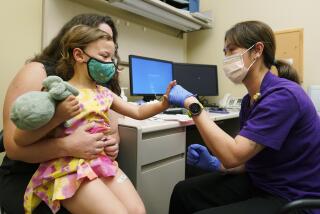OC HIGH: STUDENT NEWS AND VIEWS : Targeting Teen Needs in Health, Prevention
- Share via
Pediatricians attend to young children; obstetricians care for pregnant women, and internists treat adults. Yet the health issues of teen-agers are significantly different from those of children and adults.
“Health care providers need to monitor the progress of puberty,” says Gail B. Slap, co-author with Martha M. Jablow of “Teenage Health Care” (Pocket Books, $14), a comprehensive family guide for the preteen to young adult years.
Slap is the director of Adolescent Medicine at the University of Pennsylvania School of Medicine and the Children’s Hospital of Philadelphia. She says that as teen-agers’ medical needs change and they become increasingly uncomfortable with their pediatricians, they often fall out of care.
With this in mind, Slap wrote “Teenage Health Care” as a reference for both teens and their parents, stressing prevention as a main theme. The last part of the book can be read as a problem arises. Issues covered include knee pain, low blood count and thyroid conditions.
Slap suggests that parents and teens read the first half of the 530-page book, which focuses on such issues as nutrition, dealing with chronic conditions and sexual identity, at their leisure and when an illness is not present. She hopes that an open discussion will ensue.
“There is a tendency for parents to look the other way when confronted about a subject they feel less comfortable with,” Slap says. “Communication is the biggest problem between parents and teens.”
She maintains that although her book is reassuring and dispenses a great deal of information, it does so without arriving at a diagnosis or offering a treatment. “The book hopefully increases awareness about a problem which exists and lays out a system of where to go for help and how to determine if the doctor is the right one.”
*
While Slap says teens should learn to become savvy health-care consumers, she cites numerous barriers in achieving that goal. Among them: payment, consent and confidentiality, age-appropriate services, sociocultural barriers and availability of services.
“Teens need visible, accessible, attractive health-care providers who can anticipate their concerns,” Slap says. “The provider should use the appropriate language and be understandable without talking down. Lack of respect is the issue which hurts teens the most. They are working hard to become adults, and if they aren’t respected, they become hurt and shut down.”
Slap says doctors who are interested in the field of adolescent medicine are either setting up practices strictly for teens or putting hours aside on weekends and evenings for this age group.
“I don’t believe that every teen needs a specialist for his or her age group. But I think that a family practitioner or intern should know the basics; it should be part of the core education,” Slap says. “Studies have shown that it isn’t important whether a girl sees a woman doctor or a boy sees a man. The imperative issue is that the doctor (be) someone to be trusted, is easy to relate to and will remain confidential.”
More to Read
Sign up for Essential California
The most important California stories and recommendations in your inbox every morning.
You may occasionally receive promotional content from the Los Angeles Times.













